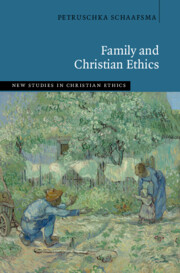Book contents
- Family and Christian Ethics
- New Studies in Christian Ethics
- Family and Christian Ethics
- Copyright page
- Dedication
- Contents
- General Editor’s Preface
- Acknowledgements
- Prologue The Difficult Question of What Family Is About
- Chapter 1 Family as Mystery
- Chapter 2 The Family Tie as Mystery
- Chapter 3 Family and Givenness as Mystery
- Chapter 4 Family and Dependence as Mystery
- Epilogue Morality of Appeal and Answer
- Bibliography
- Index
- Titles published in the series (continued from page iii)
- References
Bibliography
Published online by Cambridge University Press: 27 July 2023
- Family and Christian Ethics
- New Studies in Christian Ethics
- Family and Christian Ethics
- Copyright page
- Dedication
- Contents
- General Editor’s Preface
- Acknowledgements
- Prologue The Difficult Question of What Family Is About
- Chapter 1 Family as Mystery
- Chapter 2 The Family Tie as Mystery
- Chapter 3 Family and Givenness as Mystery
- Chapter 4 Family and Dependence as Mystery
- Epilogue Morality of Appeal and Answer
- Bibliography
- Index
- Titles published in the series (continued from page iii)
- References
Summary
- Type
- Chapter
- Information
- Family and Christian Ethics , pp. 305 - 316Publisher: Cambridge University PressPrint publication year: 2023
- Creative Commons
- This content is Open Access and distributed under the terms of the Creative Commons Attribution licence CC-BY-NC 4.0 https://creativecommons.org/cclicenses/

